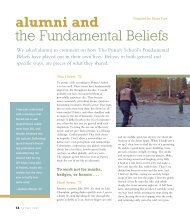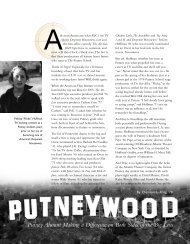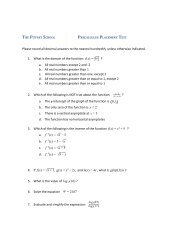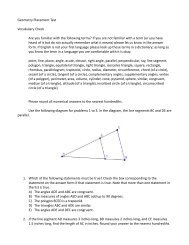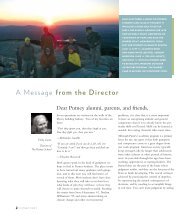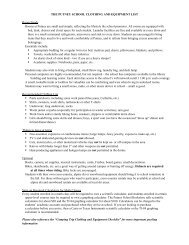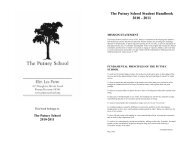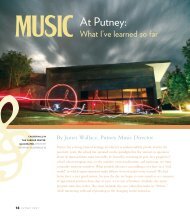PATRIOTISM - The Putney School
PATRIOTISM - The Putney School
PATRIOTISM - The Putney School
Create successful ePaper yourself
Turn your PDF publications into a flip-book with our unique Google optimized e-Paper software.
<strong>PATRIOTISM</strong><br />
A N D<br />
THE PUTNEY SCHOOL<br />
21st Century Patriotism/20<br />
Standing Firm/22 A Broader View of 9/11/24<br />
Fog of War/26 Liberia/28 Attempt/31<br />
18 P UTNEY P OST
<strong>PATRIOTISM</strong> is a word much bandied about since September 11, 2001.<br />
A patriot used to be someone who simply,“loves, supports and defends his<br />
or her country and its interests,” according to the Random House Webster’s<br />
College Dictionary. <strong>The</strong> second definition now reads,“a U.S.Army antiaircraft<br />
missile launched from a tracked vehicle with radar and computer guidance.”<br />
Notions of individual patriotism seem to have gone equally ballistic. ★<br />
Patriotism is an odd topic for the <strong>Putney</strong> Post. Many <strong>Putney</strong> alumni, some<br />
faculty, past faculty and current students are not Americans. Many more are,<br />
but have lived outside of the U.S. for most of their lives. Perhaps you were<br />
shocked upon seeing an American flag on the cover—or relieved when you<br />
saw the detail shot on the back cover and realized it was a sculpture. It seems<br />
there are people in this country who would like to exclude iconoclasts and<br />
other such undesirables from any definition of patriotism. ★ Number six<br />
of Carmelita Hinton’s eight founding principles of <strong>The</strong> <strong>Putney</strong> <strong>School</strong><br />
reads, “To combat prejudices caused by differences in economic, political,<br />
racial, and religious backgrounds; to strive for a world outlook, putting oneself<br />
in others’ places, no matter how far away or how remote.” So where<br />
does patriotism fit? Can you love your country as much as you love the<br />
whole world and still be a patriot? ★ Nobody has a short answer. But it is<br />
a fine excuse for inspiring some of our more widely experienced alumni<br />
and faculty to share their opinions. Herewith, you will find essays, a poem,<br />
a reprint of a New York Times story by Tim Weiner ’73 and a movie review<br />
of Errol ’65 Morris’ Oscar-winning documentary, Fog of War, for no better<br />
reason than the need for something to be said. Eric Westervelt ’86 will write<br />
something for us eventually. He’s had his hands full, broadcasting reports on<br />
National Public Radio from Iraq, since the invasion began. ★ Color photography<br />
teacher, Pete Guenther ’80, provides the flag images found<br />
throughout this section.<strong>The</strong>y’re from a collection of “found flags,” currently<br />
on display in the alumni art show in the Michael S. Currier Center gallery.<br />
Come see them in color. ★<br />
S PRING 2004<br />
19
21st Century Patriotism/Janet Thompson Keep ’38<br />
I HAVE A FRIEND AND NEIGHBOR, a distinguished Sudanese political exile and Arabic<br />
scholar in his 50s, who for ten years has been teaching and counseling troubled urban Black<br />
youngsters mandated by the courts to the Berkshire Farm <strong>School</strong>, not far from where I live.<br />
One day I asked him,“Why?” And he told me this story.<br />
Years ago, from the multicultural safety of the University of Hawaii, where he received two<br />
advanced degrees in his field, he returned home for a brief visit to his tribal extended family, Moro<br />
Christians in southern Sudan.<br />
One of his aging uncles took him aside and said,“What have you done for the children?”<br />
My friend was puzzled.A painful ancestral memory slowly unfolded: Many years ago, several of his<br />
great-great uncles had been yanked from their childhood homes and carried off into slavery in America.<br />
<strong>The</strong> near-illiterate uncle persisted.“You must find them.You must care for these children.”<strong>The</strong>ir<br />
souls can not rest in peace, was the message.<br />
A light went on. For my friend it was a wake-up call.<strong>The</strong> visit home changed his life direction.<br />
To me, my friend is a true 21st century patriot in our community, given his deep love of his adopted<br />
country, who participates fully in its democratic institutions, and has a passion to eliminate violence<br />
in the lives of its least citizens and help them find a future while he spreads knowledge of<br />
the wider world that undergirds his consciousness.<br />
I began to wonder how much <strong>The</strong> <strong>Putney</strong> <strong>School</strong> had been the wake-up call for me and all of us<br />
in the early classes, molding our worldview in those difficult times. “Think globally, act locally,”<br />
the well-known mantra of the peace and social justice community, jumps to mind as I wrestle with<br />
these broad concepts as they relate to patriotism and citizenship today. Did it all start for me, way<br />
back, when I arrived at <strong>Putney</strong> in 1935?<br />
20 P UTNEY P OST
We were about 50 boys and girls with 20 faculty and staff. Most of us had been yanked out of an<br />
urban culture to lead, as Mrs. H. hoped, simple lives as part of a rural Vermont community during<br />
the Great Depression. Teachers and students, we came together from all over, several as refugees<br />
from occupied Europe.<br />
Vivid memories are not just what we did in class, but of our lives outside our farm on West Hill.<br />
A few glimpses: Having no large space of our own, we square-danced with our village neighbors<br />
at their Saturday night “socials.” We invited them to our Harvest Festivals as the farm began<br />
producing again.We trucked our plays and music programs to town halls across Windham County<br />
and our pigs and chickens and calves to 4-H fairs. We became friends with then-Lieutenant<br />
Governor George Aiken, our neighbor, through his passion for wildflowers. His children were our<br />
classmates. Sunday evenings, we discussed deep matters of the world and of the heart with<br />
Mrs. H. and visiting guests.<br />
Though seemingly isolated in the countryside when times were difficult, we were fully in touch<br />
with a real America and the wider world beyond West Hill.<br />
How does my friend’s story, my life at 1930s <strong>Putney</strong> and after, and the educational responsibilities<br />
of <strong>The</strong> <strong>Putney</strong> <strong>School</strong> today relate to the deeper issues of “patriotism” and the role of our nation<br />
in the troubled world of the 21st century?<br />
I don’t recall our reciting the Pledge of Allegiance or saluting the flag each morning, as I had done<br />
in 6th grade at P.S. 160 in Washington, DC.We learned to live the words instead. Crucial values<br />
became more deeply embedded than rote repetition of a phrase.<br />
A basic idea behind John Dewey’s concept of progressive education was learning by doing. Mrs. H.,<br />
in her way, would paraphrase William James, whom she had studied at Bryn Mawr, “If you find<br />
yourself deeply stirred by what you read or see, it is harmful for you to let this emotion dissipate<br />
itself without action. DO SOMETHING!”<br />
She could “think with her feet.” Early progressive educator Francis Parker wrote of “the challenge<br />
of making democracy work.” Longtime <strong>Putney</strong> head Ben Rockwell spoke of “the infinite value of<br />
every single human being.” From the earliest days, we began to dream of a better world, and developed<br />
a deep moral commitment to help build a dynamic and healthy America in a world at peace.<br />
It all seems quite simple, in concept.We have come to see our beloved nation as one among many,<br />
truly “e pluribus unum” on our beleaguered planet. <strong>The</strong> hard part is standing strong and, out of<br />
love for our country, continuing to speak out for what we believe. ★<br />
Janet Thompson Keep ’38 received the Martin Luther King Peacemaker Award from the Northern<br />
Berkshire Community Coalition in North Adams, Massachusetts last January.After <strong>The</strong> <strong>Putney</strong> <strong>School</strong><br />
and Radcliffe College, Janet worked for the Office of Strategic Services as a research analyst and writer<br />
specializing in Asia.A licensed psychotherapist, Janet has worked more recently at the Counseling Center<br />
in the Berkshires and at the Berkshire Council on Alcoholism and Addictions, heading that agency’s<br />
North Adams office. She has been a vocal opponent of U.S. military action in Iraq.<br />
S PRING 2004<br />
21
Standing Firm: Let’s Not Forget That Freedom Comes<br />
at Great Cost More Often Than Not/Stephen Tanner ’40<br />
I N J UNE 1940, six hours before our final French class and one day before graduation, Hitler’s<br />
troops stormed into Paris.We knew that war would be a fight to the finish with only one winner.<br />
In the war into which the class of 2004 will graduate, only one side will prevail and this current<br />
war could, like the Cold War, last for decades.We cannot go back to the status quo any more than<br />
we can give birth to our own grandmothers. Here are some other items to ponder:<br />
Had Hitler or Stalin won,<strong>The</strong> <strong>Putney</strong> <strong>School</strong> and America as we knew it would no longer have<br />
existed.World War II confirmed that the freedoms we enjoy are far from free: Bud Whipple ’40,<br />
Lynn Pitcher ’41 and many of my college friends lost their lives in that war. <strong>The</strong> current war<br />
against terrorism reconfirms the costs of freedom, though total deaths in Iraq to date amount to<br />
only one percent of the casualties in three days at the Battle of Gettysburg.<br />
During WWII and the Cold War, quite a few <strong>Putney</strong> graduates volunteered for military and government<br />
careers, including intelligence work. Hardened by international realities, their various opinions<br />
ought to be considered by <strong>Putney</strong>ites of more recent vintage. Here are some of my own views:<br />
We live in an age of great progress in communication, medicine, armaments, etc., but with almost<br />
no progress in human behavior. Humans love espousing passionate causes and 9/11 split American<br />
public opinion down the middle by forcing each of us to lay our cards on the table—are you a<br />
liberal or are you a conservative? <strong>The</strong> war in Iraq also showed us which nations are our friends and<br />
which nations and organizations are pseudo-neutral, or else on the terrorists’ side.<br />
Outrageous propaganda attacks back and forth between left-leaning liberals and right-leaning<br />
conservatives are now multiplying as the presidential election approaches. (By definition, propaganda<br />
in itself is outrageous because it involves an artful selection of facts leading to a conclusion<br />
you would not reach if you knew all of the facts.)<br />
In a democracy, honorable and reasoned debate is encouraged, but, no matter who is president,<br />
vicious anti-administration invective and baseless conspiracy accusations do little more than deface<br />
America’s image and energize America’s enemies.<br />
America’s current firmness and willingness to sacrifice our lives and money to free other countries<br />
and to prevent the proliferation of weapons of mass destruction has not gone unnoticed at<br />
22 P UTNEY P OST
the global level. Our firmness has enhanced our image and created positive repercussions in Libya,<br />
Pakistan, India and, seemingly, in North Korea as well. Forty nations have sent personnel to help<br />
quell terrorism and stabilize Iraq and Afghanistan. International cooperation among intelligence<br />
services has never been higher. In addition, we and our allies have found effective uses for money<br />
and espionage to ferret out terrorists and preemptively beat them to the punch. I received an AP<br />
email on March 4 saying, “Of the eight countries polled, a majority in the five countries—the<br />
United States, Canada, Mexico, Italy and Britain—say that even if no weapons of mass destruction<br />
are found in Iraq, there were other reasons to justify the war.”<br />
America slept complacently through the 1990s, preoccupied for two years by the O.J. Simpson<br />
affair, followed by two years of Monica Lewinsky, and one year of Gary Condit/Chandra Levy.<br />
Terrorists attacked us four times in that decade, but even that did not arouse us from our narcissistic,<br />
isolationist, self-satisfied dreamings. No wonder al-Quaeda mistakenly thought we were<br />
cowardly, decadent, unpatriotic paper tigers.<br />
Islamic fundamentalists and Taliban-like groups believe we pose an intolerable threat to their family<br />
life, culture and religion because of our permissive mores regarding the disciplining of children,<br />
our allowing unmarried men and women to live together, our relaxed attitudes toward adultery,<br />
homosexuality, public drunkenness and even young women displaying bare navels. <strong>The</strong>y loudly<br />
declare our lifestyle, films,TV, songs and literature to be an anathema and insult to Islam that must<br />
be combated before they contaminate Islam.<br />
For Muslims with such strict, orthodox views, we win no brownie points for our billions of dollars<br />
in aid to Muslim countries, or for kicking the Russians out of Afghanistan. <strong>The</strong> war in Iraq has<br />
also revealed what al-Quaeda is all about as it tries to create havoc by killing hundreds of fellow<br />
Arab Muslims. My friends from Iran,Turkey and Iraq think if al-Quaeda has or can get an atom<br />
bomb, it would use it, probably before this November, with no qualms whatsoever.<br />
I imagine <strong>Putney</strong> lacks highly educated Arabs and other Muslims qualified to explain past history,<br />
current events and predict the future. Fortunately, in my era, we had half a dozen German and<br />
Austrian refugees at <strong>Putney</strong> who, in general, predicted accurately what the Nazis would do.<br />
I respect highly the training in independent thinking we all receive at <strong>Putney</strong>, and if <strong>Putney</strong> has not<br />
enough in-house expertise to fathom the war between the western world and Islamic extremists,<br />
I strongly recommend four books to help students, faculty and alumni distinguish truth from bunk.<br />
<strong>The</strong> books are: A Study of History, by British historiographer, Arnold Toynbee; <strong>The</strong> Clash of<br />
Civilizations, by the head of Harvard's political science department, Samuel Huntington; What<br />
Went Wrong, by a foremost scholar of Islamic history, Professor Emeritus Bernard Lewis of<br />
Princeton; and, lastly, <strong>The</strong> Future of Freedom: Illiberal Democracy at Home and Abroad, by Fareed<br />
Zakaria. I submit that these books can help any <strong>Putney</strong>ite decide for him- or herself what, if any,<br />
macrocosmic role to play in achieving <strong>Putney</strong>’s core goal of improving the world. ★<br />
Steve Tanner ’40 intercepted, decoded and translated German short-distance/high-frequency radio messages<br />
near the front as a member of the Army Signal Corps during World War II. After the war, he returned<br />
to Yale to finish his studies and went on to do international intelligence work in the State Department<br />
as a Foreign Service officer. Lest you be misled, Steve admits that he’s voted both Democrat and<br />
Republican. He has founded chamber music groups in Vermont and California and gives talks on foreign<br />
affairs when he’s not writing funny books. His latest, Tours de Farce, should be published by the time<br />
you’re reading this. Steve’s the publisher, so to get your copy, contact him at Sntann@aol.com.<br />
S PRING 2004<br />
23
A Broader View of 9/11/Sydney Snyder<br />
(Ed Note: Sydney Snyder, an S.I.T. grad and recent addition to our ESL faculty, read this story in<br />
Assembly last fall on the second anniversary of September 11, 2001.)<br />
H ONESTLY,I FEEL NERVOUS speaking about such an emotional topic in front of a group<br />
where I don’t feel quite safe yet. But I believe it is September 11th and the events that followed,<br />
including the attack on Afghanistan, the Bali bombings and the war in Iraq which have led me to<br />
<strong>Putney</strong> and are huge factors in the work that I do and my vision for the future. So, I want to share<br />
with you a little about my experience of these events.<br />
On September 9th, 2001, I arrived home to Washington State after a year in Indonesia. I came<br />
home for a three-week visit with my family and the wedding of a friend. On September 11th,<br />
I awoke to a muted television set filled with images of a plane barreling into a building. How many<br />
times since then have we been shown that image?<br />
Muslim terrorists were almost immediately named—a Koran left behind in a rented car. I lay<br />
awake those first few nights trying to sort out the meaning, somehow feeling that Indonesia felt a<br />
lot closer to me than New York.<br />
A few of my Indonesian graduate students e-mailed, asking if I thought it was a Jewish conspiracy<br />
designed to make the Arabs look bad. No Jews were killed in the attack that day they wrote. At<br />
least that is what their media was telling them.<br />
I went to the public library in my small hometown and overheard two women, decked in red,<br />
white and blue, speaking to each other.“I definitely wouldn’t go to Indonesia right now.” One said<br />
to the other.“It isn’t safe.” Or at least that is what our media was telling them.<br />
“Come back, come back,” wrote my friends and colleagues.Yogyakarta is safe.You’ll be safe. But<br />
pictures of Bush were being burned in front of the U.S. embassy in Jakarta and the U.S. State<br />
Department wouldn’t let me go back.“Wait,” they told me. And I waited. I waited for the attack<br />
on Afghanistan. I waited for the beginning of Ramadan.And while I waited the patriotism mounted.<br />
<strong>The</strong> hatred and divisiveness mounted too.<br />
24 P UTNEY P OST
A man wearing a turban in Arizona was beaten. I thought about my gentle Muslim boyfriend and<br />
what it might be like for him if he were in the U.S. right now—and for those Muslims,Arabs, or<br />
other foreigners who might look Muslim or Arab that were here now and were afraid.<strong>The</strong> world<br />
became divided into Good and Evil—With Us or Against Us. I felt as though I was a small child<br />
watching Saturday morning cartoons with the superheroes and the evildoers fighting for control.<br />
I kept wondering which group was mine.“You don’t seem to like America very much,” a friend<br />
said to me. I tried to explain that the very things I loved most about the U.S., the diversity and the<br />
freedom to say and do what we believe, were the very things that were being destroyed.<br />
Finally, I was allowed to return to my home in Indonesia. I arrived just before Idul Fitri, the<br />
celebration marking the end of Ramadan.What I found in Indonesia was that, just as some of us<br />
in the U.S. were angry at what the American government was doing in the name of security and<br />
democracy, many there were angry that violence was being used in the name of Islam. Jihad, a<br />
term all too familiar to us now, means a struggle in the name of God. Jihad can be a woman<br />
giving birth. Jihad can be a man working in a rice field to feed his family. Jihad can be someone<br />
educating sex workers about AIDS. Now, however, to much of the world, jihad conjures up images<br />
of violence and extremism. Not too long ago, I sat in a classroom with an Indonesian colleague<br />
and he told our students about the Not In Our Name movement and how many Americans wanted<br />
to work to end the violence of war and make clear that the current U.S. administration’s policy<br />
was not supported by us. He explained that such work had to occur in Islam too. Moderate<br />
Muslims must join together because violence in the name of religion must not be tolerated.<br />
Since that moment, I have realized that we must all work together to bridge, and then cross,<br />
boundaries. Cultural differences can be so incredibly challenging, but until we strive to really<br />
understand one another—until we are not afraid to take a risk and sit with the person who is<br />
different from us and share our pizza or their felafel, chipati, or nasi goring—the violence is<br />
always going to win. Some days the challenge of the hate and power that we are facing overwhelms<br />
me, but then I see a Korean student and an American student washing dishes side by side, and<br />
I am hopeful. ★<br />
S PRING 2004<br />
25
Fog of War:A Film Review/Lorne W.S. Johnson<br />
M ANY VIEWERS of Errol ’65 Morris’ Fog of War will come seeking answers to the Vietnam<br />
era and carrying a great deal of baggage.Vietnam shaped a generation in this country. It shattered<br />
our naivete—that we were always on the right side, that our leaders were fair minded and candid,<br />
and that the world all wished to be just like us.<strong>The</strong> war produced a backlash against government,<br />
authority, and even society as a concept, which affects our daily lives today at a variety of levels.<br />
For this reason I suspect that many will be struck (or disappointed) by two departures in the film.<br />
First, Robert McNamara’s cinematic stature as a star is remarkable. Second, the most perceptive<br />
aspects of the film are not about Vietnam at all, as both Morris and McNamara are well aware.<br />
<strong>The</strong> film opens with McNamara picking up an interview in mid-sentence with an aside.“You’ll<br />
just have to fix it, because I won’t go back. I know exactly what I wanted to say next . . .”<br />
Immediately, the camera, the sound crew, and the audience are drawn to him in rapt attention.<strong>The</strong><br />
essence of this image is repeated in a 1960s documentary clip where McNamara strides to a press<br />
conference podium, plunges into his material, and abruptly withdraws to check the sound, the<br />
television crews, and the sight lines. McNamara responds to the media intensely, and that makes<br />
possible a film, which is essentially a monologue by an octogenarian shown in innumerable, tightlycropped<br />
shots of his time-worn visage.<br />
Fog of War is a collaboration between McNamara and Morris to get at the disturbing realities of<br />
decision making and the follies of governing, which (as Thucydides noted) “are very likely to repeat<br />
themselves.”<strong>The</strong> film presents “Eleven Lessons from McNamara’s Life” which provide a useful focus<br />
for viewing the film in real time, but which is less useful for viewing the film as a whole.<strong>The</strong> greatness<br />
of both men’s visions comes from refusing to plunge into the specifics of the Vietnam era without<br />
setting that era into the worldview of the nation in general and Robert McNamara in particular.<br />
While my generation was shaped by Vietnam, McNamara was shaped by the Great Depression, the<br />
Second World War, and the Cold War.<strong>The</strong>se were all profoundly disturbing and real events exerting<br />
enormous emotional force on the individuals who lived through them. Robert McNamara<br />
struggled through the depression and emerged as a “whiz-kid” in the use of statistical analysis made<br />
possible through the use of the IBM mechanical sorting machine, that is, the computer.<br />
McNamara left his post at Harvard to form an Army Air Corps strategic think tank, and this new<br />
technology (skillfully analyzed by the technocrats and used to develop war strategy, largely by<br />
General Curtis Le May) had a significant, even dramatic effect, on the war in both theaters of operation.<br />
Readers of Catch-22 will certainly find Yossarian aboard the many aborted B-24 missions<br />
in McNamara’s analysis of heavy bombing in the European theater of operations. But it is his candid<br />
analysis of the B-29 bombing of Japan that should unnerve Americans not thoroughly familiar<br />
with the Pacific theater. U.S. planes firebombed not just Tokyo, but 67 Japanese cities before<br />
unleashing the atomic bomb on Hiroshima and Nagasaki. <strong>The</strong> film individually names each<br />
Japanese city and its appalling percentage of destruction while pairing it with an American city of<br />
comparative population. In the 1940s such brutality was readily accepted, and even praised as necessary<br />
conduct in war, or at least of a war of that nature.War, or at least the Vietnam War, would<br />
look very different to the public in the 1960s.<br />
In “Lesson 1: Empathize with your Enemy,” McNamara examines the Cuban missile crisis and our<br />
incredibly close brush with all-out nuclear exchange, including tributes to President Kennedy and<br />
Ambassador Llewellyn Thompson. Here he experiences a split with General Le May who appears<br />
to have been looking for an excuse to deal with the Russians once and for all.This lesson is two<br />
sided. On one hand, the United States came out of the crisis looking firm without being reckless.<br />
On the other, the country came closer to a nuclear war than anyone (including Le May) had any<br />
idea of at the time. Both these ideas are of profound importance to McNamara.<br />
26 P UTNEY P OST
As the film shifts into Vietnam following an interlude at Ford Motors (with special emphasis on<br />
seat belts and small cars), McNamara juxtaposes Thompson’s insight into Khrushchev’s psyche with<br />
the Le May principle of overwhelming force. He is clear about Washington’s virtually complete<br />
misread of Hanoi, and his comparison of the scale of Operation Rolling Thunder with heavy<br />
bombing in WWII, while hard to grasp in a single viewing, is truly a glimpse into the abyss. He<br />
searched for a technocrat’s answer, while distrusting escalation. <strong>The</strong> goals are remote, and vision<br />
obscured by the “fog of war.”While he never says so, it is likely that McNamara was utterly unprepared<br />
for the anger and derision that would be directed at him.<br />
It is customary to view such explanations by public figures as self-serving, and no doubt they are.<br />
Still, McNamara opens the film with the basic premise that Vietnam was a catastrophic mistake.<strong>The</strong><br />
fire bombing of Japan and the Cuban Missile Crisis are not intended to justify Vietnam, but to provide<br />
a context for understanding what happened. On the home front, McNamara pays due respect<br />
to Norman Morrison, the Quaker who protested the war via self-immolation outside McNamara’s<br />
office. His ambivalence about escalation in Vietnam under both Kennedy and Johnson is certainly<br />
interesting (and the taped conversations between McNamara and both presidents make his discomfort<br />
with the situation downright palpable), but it is his role as a “company man” which is, to<br />
me, most telling. Robert McNamara grew up in an age when loyalty to leaders was not viewed as<br />
merely expected, but as essential to a functional society. And that, he was. He weeps in recalling<br />
Kennedy’s death, and lied valiantly for the Johnson administration even as he privately opposed its<br />
policy.While this is certainly McNamara’s take on events, it is also a take well worth considering.<br />
We now tend to assume that because there were so many wrong decisions about Vietnam that<br />
there must have inherently been right decisions as well. Fog of War takes us at least a step away<br />
from such naïve foolishness and a step closer to the reality that leadership is a treacherous business<br />
often turning on its participants.Vietnam undid Lyndon Johnson’s presidency. Richard Nixon and<br />
Henry Kissinger, of course, followed Johnson and McNamara into the quagmire of Indochina (and<br />
it would be difficult to imagine four more diverse U.S. politicians).<br />
Errol Morris conceives his film with the skill of a master craftsman. He has a marvelous sense of<br />
the eccentric in crafting the visuals to the film. <strong>The</strong>re is much pastiche or war footage, and the<br />
visual does not always correspond obviously to the theme or even time period of the voice-over.<br />
Still, as the film progresses, it makes more and more sense. Late in the narrative is an extended shot<br />
of two men sitting under a plane and winching a rather large bomb into the fuselage.<strong>The</strong> languid<br />
manner of their progress amid the “fog of war” is remarkable in its portrayal of both the senseless<br />
and purposeful. Morris collaborates with McNamara, but nowhere does he show more finesse than<br />
when he delineates the limits of his collaboration. In one shot, McNamara refers to the personal<br />
stress of the Vietnam period, and the tensions it produced in his own family, adding “But I’m not<br />
going to talk about my family.”<strong>The</strong> pause following is profound for both men. In the epilogue,<br />
Morris presses McNamara for a verdict. Morris says in summation,“So you’re damned if you do,<br />
and damned if you don’t?” McNamara answers,“That’s right, but I’d rather be damned if I don’t.”<br />
Fog of War raises far more questions than it answers, but they are important questions. If Morris<br />
and McNamara compel us to rethink the Vietnam experience and the nature of leadership, we will<br />
be better citizens for it, whatever conclusions we may draw. ★<br />
Errol Morris ’65, won an Academy Award for best documentary (long format) for Fog of War. Lorne<br />
Johnson is <strong>The</strong> <strong>Putney</strong> <strong>School</strong>’s history chair and, obviously, a man who knows his historical facts and<br />
circumstances.We are grateful to both of them for helping to enlighten the rest of us.<br />
S PRING 2004<br />
27
At 14, a Liberian War Veteran<br />
Dreams of Finding a Way Home/Tim Weiner ’73<br />
“THE WAR CAME before the rains in 2000,” Dukuly Togbah remembered.“I was 10 years old.”<br />
Dukuly is a smart, tough country boy from the northern hills. He was one among the thousands<br />
of child soldiers who have fought this nation’s grisly battles for 14 years.<br />
He is 14 himself, born on Independence Day, July 26. His story is the story of Liberia.When he<br />
was in the first grade he started to fight with rebel forces and, when captured, he was forced on<br />
pain of death to fight for the government. He survived it all by the skin of his teeth.<br />
With the chance that the war may be dying down now, Dukuly (pronounced Due-CLAY) has<br />
been out of combat almost three weeks, and lives in a shelter run by a Catholic charity here in<br />
Paynesville, on the outskirts of Monrovia, where he is learning to read and write. He stands about<br />
5 feet 2 inches and weighs perhaps 100 pounds.<br />
Three years and four months ago, he was taken from his village, Kambolahun, in Lofa County, near<br />
the borders of Sierra Leone and Guinea, by the rebel group Liberians United for Reconciliation<br />
and Democracy, known as L.U.R.D., who overran his village.<br />
What happened to his family is unknown; it is very possible that they are among the 600,000<br />
refugees among Liberia’s population of three million.<br />
<strong>The</strong> rebels tried to overthrow President Charles G.Taylor, himself a former warlord who fought<br />
his way to power on the backs of battalions of child soldiers, who seldom lack for weaponry.<br />
Mr.Taylor, who left power on August 11, 2003 under indictment for war crimes in Sierra Leone,<br />
did not invent the practice of using children in combat. But he did introduce the phenomenon to<br />
Liberia. Perhaps 10,000 children remain mobilized among government forces and the rebels. All<br />
the main factions used what they call Small Boy Units, sometimes abducting children, sometimes<br />
luring them with the promise of the glory of war. Dr. Peter Coleman, the Liberian minister of<br />
health and social welfare, said of the child soldiers,“In some areas they are 40 to 50 percent of the<br />
fighting force.Young people with arms has become a way of life.” Dr. Coleman said there were no<br />
social services or public health facilities in the nation to treat or rehabilitate the thousands of child<br />
soldiers. Dukuly spoke vividly and dispassionately in English of his experience. By comparison,<br />
some of his youthful colleagues are so traumatized by the experience that they can hardly speak.<br />
“I can remember I used to play with my friends, and sometimes we would go in the bush and set<br />
traps to catch meat,” he said.“But since the war I can’t see my friends.<br />
28 P UTNEY P OST
“<strong>The</strong> first time I saw fighting I was 10 years old,” he said.“It was dissidents and government.<strong>The</strong><br />
dissidents were four or five in the village by the time the sun come up.<strong>The</strong>y shot up my home<br />
and we all run in the bush. My parents, everybody run away, me too. I started running and they<br />
opened up firing.<strong>The</strong>y captured me.”<br />
“So now I can’t see my family,” he said.“So I followed the people.”<br />
“I fought with L.U.R.D. in the bush,” he said, learning to fire an AK-47, walking point, winning<br />
a battlefield commission and a nom de guerre. “I was the deputy commander of the Small Boy<br />
Unit under General Iron Jacket.<strong>The</strong>y call me Quick to Fire. Iron Jacket gave me that name.”<br />
Iron Jacket’s Small Boy Unit was about 100 strong, Dukuly said, and the rebel force under the general<br />
grew to about 2,000, including many women and girls abducted from villages to cook rice,<br />
catch fish and serve the men and boys. Babies were born in the bush.<br />
<strong>The</strong> rebel force slowly fought its way south through Lofa County, battling government troops in<br />
at least four major engagements and countless skirmishes during the next three years, destroying<br />
villages and displacing tens of thousands of people in the process.<br />
Liberia’s government-run radio station reported late tonight that major fighting had broken out<br />
in Bong County, in the heart of the nation.<strong>The</strong> station broadcast unconfirmed reports that rebels<br />
had killed hundreds of civilians in recent days.<br />
Many of Iron Jacket’s troops used magic and ritual to protect them in battle.<strong>The</strong>y called it medicine.<br />
<strong>The</strong>y wore spent bullets as amulets and rubbed powders on their chests to shield their hearts from<br />
harm. <strong>The</strong>y put on women’s wigs to transubstantiate their bodies, to turn into someone else, to<br />
leave their physical beings and strengthen their spirits.<br />
<strong>The</strong>y also used cocaine for courage.<strong>The</strong> only psychiatrist in Liberia, Dr. Edward Grant, said drug<br />
abuse added to the horrors of war there.“<strong>The</strong>se children are the most dangerous segment of the<br />
fighting machine,” he said. “<strong>The</strong>y have been used to commit atrocities under the influence of<br />
drugs.”“I can’t lie on myself,” Dukuly said.“I used to take it. It made me brave. Iron Jacket used<br />
to give me it.You take it in your nose or you smoke it in your grass. I used to feel brave. I used to<br />
get the mind to fire the gun. Sometimes we take it when we relaxing, but most of the time we<br />
take it in battle.<br />
“Sometimes Iron Jacket would give me some kind of white chalk to rub on my body so the bullets<br />
can’t touch me,” he continued. “But I never used to like it.When I go on the battlefront, frontline<br />
troop, I can pray to God.When I come back, I can tell God thank you. I had my Bible in my<br />
pocket. I don’t know how to read. But every time I go on the front line, I would knock it on<br />
my head, put it in my pocket and go.<br />
“Sometimes the medicine my friends use, when the rocket come in, it can pick them up so the<br />
rocket can’t do nothing to them,” Dukuly said. “And when the bullet come, it just bounce off<br />
them. My best medicine was the drug—that drug called cocaine.”<br />
Tons of cocaine arrived in Liberia in the 1990s, government officials here said.<strong>The</strong>y said war made<br />
the borders porous and turned the nation’s ports into transshipment points for international smugglers<br />
of drugs and weapons.<br />
Good fortune was also with Dukuly, along with guns and drugs.<br />
“<strong>The</strong> reason I survive?” he said.“Because sometimes when we go into villages and my friends be<br />
beating and tying the people, I say, ‘Y’all stop.’ And sometimes when we get rice, I can divide it,<br />
give them one, two cup of rice.That put good luck behind me.”<br />
S PRING 2004<br />
29
“Most of my best friends, they were killed,” he said. “My friends who used to call me Quick to<br />
Fire. We used to wrestle together. But we ourselves, we also killed plenty. When they killed my<br />
friends and I feeling bad, Iron Jacket would tell me, my boy, that’s war.You got to be brave.”<br />
In June, the L.U.R.D. forces fought their way to the edge of Monrovia. <strong>The</strong>n began the three<br />
major battles between the rebels and Mr.Taylor’s forces known here as World War One,World War<br />
Two and World War Three.<br />
“I fought World War One,” Dukuly said.“We attack, we retreat.World War Two, the fighting were<br />
not easy.Too hard.<strong>The</strong> government come with plenty force. Iron Jacket, everybody leave.<strong>The</strong>y leave<br />
me behind when government forces come back. I hid in an old car. And then they capture me.”<br />
“<strong>The</strong>y caught me and tied me,” he continued.“<strong>The</strong>y wanted to kill me, but one general saved my<br />
life.To prove myself to the general, Sweet Candy, to prove I was a man, I had to fight. I fought one<br />
month for government forces against my people. I wanted to run away, to go to my men. If I go,<br />
they kill me.<br />
“I feeling bad,” Dukuly said.“I killing people’s forces, fighting my brothers, killing my brothers. But<br />
I had no choice. Many, many days I did not want to go fight, but if I did not, they would kill me.”<br />
<strong>The</strong>n came World War Three.“<strong>The</strong> last fighting, the L.U.R.D. men bring all the jungle mortars,”<br />
Dukuly said.“<strong>The</strong>y attack from all over.<strong>The</strong>y killing us.”<br />
In the final days of World War Three, Dukuly ran for his life and found shelter with the Catholic<br />
charity, Don Bosco Homes.<br />
A visitor at the shelter asked him what the fighting was all about. “I must say, I don’t know,”<br />
Dukuly said.<br />
“Our commander used to say we going to kill Charles Taylor,” he said.“For me, I just used to take the<br />
drug and in my head I know the government troop, that my enemy, so anytime I see them, I fire.”<br />
“Now I want to fight no more,” Dukuly said. “I’m thinking about my people. I want to go to<br />
school.When I go to school, I want to be a teacher. I want to go back home.” ★<br />
This story originally appeared in an August 2003 issue of the New York Times. It’s reprinted here<br />
with the author’s permission.<br />
Tim Weiner ’73 spent what he calls his “summer vacation” in Liberia last year. If you read his piece on<br />
Afghanistan in the Spring 2002 issue of the <strong>Putney</strong> Post, you’ll know that he’s good at getting on the<br />
ground level of war stories and presenting them on a human scale. After 23 years in Mexico, Tim is<br />
returning to live in New York City. He says,“I’m going to swap houses one week each summer with Marti<br />
Straus ’73 up on Dusty Ridge Road [in <strong>Putney</strong>] so my girls will get a taste of the green leafy world.”<br />
30 P UTNEY P OST
Attempt/Harry Bauld<br />
Yesterday Lizzy said,<br />
Dad, read something that isn’t so depressing.<br />
That seems depressingly easy to do, or try:<br />
we are not at war, you and I.<br />
At least, it’s easy to see no war touches me.<br />
Take a Sunday like today, with no paper, no TV:<br />
where’s the war?<br />
I woke late to a blue sky (no war there),<br />
sang flat some Cole Porter while I washed up, (no war)<br />
shaved and smelled of vetiver and watched<br />
spring row its little dinghy through March’s stubborn chop (no war),<br />
the air lighting on the back of my neck like a wren, (no war)<br />
went into town and bought a few tubes of glitter<br />
and some ziplock plastic bags (don’t ask),<br />
couldn’t find the right mask (certainly no war),<br />
walked happily in love through the warm driz—zle<br />
on Main Street (no war on any Main Street),<br />
ran into Bill and Lena, and Helen who runs the theater (no war),<br />
ATE well all day: in the morning oatmeal<br />
and blueberries (in March!), a bit of maple syrup,<br />
a macaroon in the Brattleboro afternoon, (no war)<br />
and later, home in the bright clean kitchen,<br />
some lettuce tender as a cat’s ear<br />
grown by Mike Collins in the next town where there is no war,<br />
a plate of fusilli corkscrewed with some roasted peppers and Italian blue cheese.<br />
But then there was the loaf of semolina bread<br />
I lifted like a newborn out of the oven,<br />
a kylix from a kiln.<br />
When I cut it open (too soon)<br />
a gasp of steam escaped like a suppressed thought,<br />
the sudden apparition of someone faraway I do not know<br />
and with whom I am not, am not, am not at war. ★<br />
Harry Bauld, English chair, left for Spain to help chaperone the March Break orchestra trip four days<br />
after terrorist bombs claimed 200 lives in a Madrid subway. He wrote Attempt one year ago, as the<br />
United States of America began invading Iraq, and read it to us in Assembly.<br />
S PRING 2004<br />
31



